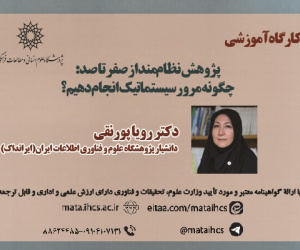نقش آلتمتریکس در تغییر رویکردهای ارزیابی پژوهش ها: از علم سنجی سنّتی تا علم سنجی مدرن (مقاله علمی وزارت علوم)
درجه علمی: نشریه علمی (وزارت علوم)
آرشیو
چکیده
هدف: هدف پژوهش حاضر بررسی نقش آلتمتریکس به عنوان یک رویکرد نوآورانه در علم سنجی و تأثیر آن بر تغییر رویکردهای ارزیابی پژوهش ها است. سوال اصلی پژوهش این است که چگونه آلتمتریکس می تواند به عنوان ابزاری مکمّل در ارزیابی تأثیرات پژوهش ها مورد استفاده قرار گیرد و به سیاستگذاران و پژوهشگران کمک کند تا نقاط قوت و چالش های موجود در نظام پژوهش را بهتر شناسایی کنند؟ روش: این پژوهش بر پایه منابع کتابخانه ای و تحلیل جامع مقالات مرتبط با علم سنجی و آلتمتریکس انجام شده است. به منظور گردآوری داده ها، مقالات و منابع معتبر در زمینه ارزیابی عملکرد پژوهش ها مورد بررسی قرار گرفته و داده های مربوط به آلتمتریکس و شاخص های سنّتی استخراج شدند. همچنین با تحلیل داده های موجود، نقاط قوت و ضعف آلتمتریکس در مقایسه با روش های ارزیابی سنّتی شناسایی شده و تأثیر آن بر ارزیابی تأثیر پژوهش ها بررسی گردید. این رویکرد شامل تحلیل نوع تعاملات در شبکه های اجتماعی، بازخوردهای آنلاین و سایر معیارهای غیررسمی است که به ارائه یک سنجش جامع و دقیق از تأثیر پژوهش ها کمک می کند. علاوه بر این، در این پژوهش برای تسهیل استفاده مؤثر از آلتمتریکس، چارچوبی برای تجزیه و تحلیل اطلاعات فراهم شده است که بتواند در سیاستگذاری های علمی و پژوهشی به کار گرفته شود. یافته ها: آلتمتریکس می تواند به عنوان ابزاری مکمّل، پژوهشگران را در توسعه دیدگاه های چندبُعدی و واقع گرایانه تری از تأثیر پژوهش ها یاری نماید. همچنین استفاده از آلتمتریکس می تواند به نوآوری و پیشرفت در سیاستگذاری های علمی کمک کند؛ به ویژه در حوزه هایی که تعاملات علمی و اجتماعی از زوایای مختلف مورد بررسی قرار می گیرند. نتیجه گیری: آلتمتریکس نه تنها می تواند به عنوان ابزاری مکمّل در ارزیابی تأثیر پژوهش ها عمل کند، بلکه با ارائه یک تصویر جامع و چندبُعدی از تأثیرات علمی، اجتماعی و فرهنگی، به سیاستگذاران در اتخاذ تصمیمات مبتنی بر شواهد کمک می کند. پیشنهادات ارائه شده در این پژوهش، شامل استانداردسازی روش های آلتمتریکس و رفع نقاط ضعف کنونی، می تواند به ارتقای کارایی و دقت این ابزار در ارزیابی پژوهش ها کمک کند. در نهایت، هدف این پیشنهادات ایجاد پل ارتباطی مؤثر بین علم و جامعه، و تقویت مشارکت پژوهشگران و سیاستگذاران در راستای توسعه پایدار است.The Role of Altmetrics in Changing Research Evaluation Approaches: From Traditional Scientometrics to Modern Scientometrics
Purpose: The purpose of this study is to examine the role of altmetrics as an innovative approach in scientometrics and its impact on transforming research evaluation methods. The primary question of the study is how altmetrics can be used as a complementary tool for evaluating the impacts of research and assist policymakers and researchers in better identifying the strengths and challenges within the research system. Method: This study was conducted using library resources and a comprehensive analysis of articles related to scientometrics and altmetrics. To collect data, we reviewed reliable articles and sources in the field of research performance evaluation, extracting information related to altmetrics and traditional indicators. Additionally, by analyzing the existing data, the strengths and weaknesses of altmetrics were identified in comparison to traditional evaluation methods, and their impact on assessing research outcomes was examined. This approach involves analyzing the types of interactions within social networks, online feedback, and other informal metrics that contribute to a comprehensive and accurate assessment of the impact of research. Furthermore, this study presents a framework for analyzing information to facilitate the effective use of altmetrics, which can be applied in scientific and research policy-making. Findings: Altmetrics can serve as a complementary tool to assist researchers in developing multidimensional and more realistic perspectives on the impact of their research. Additionally, the use of altmetrics can foster innovation and progress in scientific policy-making, particularly in areas where scientific and social interactions are analyzed from various perspectives. Conclusion: Altmetrics can serve as a complementary tool for assessing the impact of research and assist policymakers in making evidence-based decisions by providing a comprehensive and multidimensional view of scientific, social, and cultural impacts. The recommendations outlined in this study, which include standardizing altmetrics methods and addressing existing weaknesses, can enhance the efficiency and accuracy of this tool in evaluating research. Ultimately, the aim of these suggestions is to establish a robust connection between science and society, while enhancing the involvement of researchers and policymakers in the pursuit of sustainable development.






